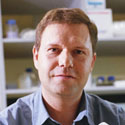Academic Editors
The following people constitute the Editorial Board of Academic Editors for PeerJ. These active academics are the Editors who seek peer reviewers, evaluate their responses, and make editorial decisions on each submission to the journal. Learn more about becoming an Editor.

Antonella Prisco
Senior Researcher at the Institute of Genetics and Biophysics of the National Research Council.

Pascal Dollé
Associate Professor in Biochemistry and Molecular Biology, Group leader (Developmental Biology and Stem Cells Department), IGBMC, France. Member of the Institut Universitaire de France.
Michael F Santillo
I have over a decade of experience leading independent laboratory research projects as a research chemist at the U.S. Food and Drug Administration (FDA). The focus of my work is using in silico (computational tools, especially QSAR) and in vitro (cellular and biochemical) methods for identifying chemical hazards associated with foods and dietary supplements.

Jui-Yang Lai
Dr. Jui-Yang Lai received his Ph.D. from the Department of Chemical Engineering, National Tsing Hua University, Taiwan. Since 2014, he is a Full Professor at Chang Gung University, Taiwan. Dr. Lai’s primary research activities are centered on the design and development of functional biomaterials, either from natural or synthetic sources, for ophthalmic use, particularly on tissue engineering, drug delivery, and nanomedicine. His major research projects involve ocular biocompatibility assessment, corneal/retinal cell construct fabrication, topical/intraocular pharmaceutical dosage formulation, and metallic/carbon-based nanotherapeutics evaluation. Dr. Lai has published more than 100 scientific papers in peer-reviewed journals and filed numerous patent applications. He actively participates in the peer review process for scientific publications and also serves as a member of the editorial board of several scholarly journals.

Sutthirat Sitthisak
Dr. Sutthirat Sitthisak is an Associate Professor of Microbiology in the Department of Microbiology and Paraitology at Naresuan University.
Her research interests include molecular characterization of antibiotic resistance and virulence genes in Methicillin resistant Staphylococci, Acinetobacter baumannii and Morganella morganii, and molecular characterization of Acinetobacter baumannii, Stenotrophomonas maltophilia and Escherichia coli bacteriophages: applications in medicine and biocontrol.

Torbjørn Rognes
Torbjørn Rognes is the Head of the Biomedical Informatics Research Group at the Department of Informatics at the University of Oslo, and a research scientist at the Department of Microbiology at Oslo University Hospital, Norway. He obtained a MSc in computer science in 1994, a PhD in bioinformatics in 2001 and a professorship in 2010. His main interest is in development of algorithms and tools for sequence analysis, and has recently worked mostly with metagenomics and metabarcoding. He is a co-author of the VSEARCH, Swarm and SWIPE tools.
Irina M. Kuznetsova
Leading research scientist of the Laboratory of Structural Dynamics, Stability and Folding of Proteins of the Institute of Cytology, Russian Academy of Science

Santiago Martín-Bravo
I am an Associate Professor and researcher at Botany Area of the Department of Molecular Biology and Biochemical Engineering at Pablo de Olavide University (Seville, Spain). I am a botanist but I also like to define myself as an evolutionary biologist. My final objective is to contribute to the knowledge and conservation of the biodiversity that surrounds us. My main research interests are on systematics and evolution of angiosperms. I try to answer questions related with the topics of when, how and why are species (and in general biodiversity) generated. I am also very interested in biogeography, this is, explaining the processes causing the distribution of species. To accomplish these task, I use multidisciplinar approaches ranging from classic taxonomy to molecular phylogenetics, estimation of divergence times, cytogenetic evolution, phylo- and biogeographic analyses. Finally, I am also interested in conservation biology, particularly in relation with conservation genetics. I am also the curator of UPOS herbarium

Regina L Cunha
I am interested in integrating phylogeographic and molecular approaches to infer evolutionary processes that explain current patterns of genetic diversity in marine organisms, particularly on isolated oceanic islands. I have worked on natural populations of marine snails from Cape Verde to address problems of speciation and geographic variation and to analyse the influence of historical processes, as the effect of sea-level changes on the genetic structure of organisms. Currently, I am interested in the identification of gamete recognition proteins involved in reproductive incompatibilities and their role in the evolution of non-geographic barriers that, ultimately, may generate sympatric divergence.

Martha Vives
Full professor, Biological Sciences Department, Los Andes University. Vice dean for Research Affairs, School of Sciences. Past coordinator for the Microbiology program.

Nicholas Geard
I am am a computer scientist with over 10 years experience in modelling the spread and control of infectious diseases. I obtained mys PhD in computer science from the University of Queensland in 2016. Following 3 years of postdoctoral research in the UK, I joined the Melbourne School of Population and Global Health in 2011, where I was awarded an ARC Discovery Early Career Researcher Award. I joined the School of Computing and Information Systems in 2016, where I am an Associate Professor leading a group of 6 postdoctoral and PhD researchers. I am also Director of the Melbourne Data Analytics Platform (MDAP), a team of 20 data scientists who provide cross-disciplinary support on computing and data-intensive research across the University of Melbourne.

Sheri L Johnson
A behavioural ecologist with broad interests in sexual selection, mating system evolution, sperm biology, behavioural epigenetics, and the effects of environmental challenges (e.g., hypoxia, toxins, and microplastics) on the reproductive and behavioural ecology of animals. Study systems include marine invertebrates, marine and freshwater fishes (including zebrafish) and terrestrial invertebrates (weta and stag beetles). Overall, Dr Johnson's research programme investigates both genetic and environmental effects on behaviour and reproductive fitness.

